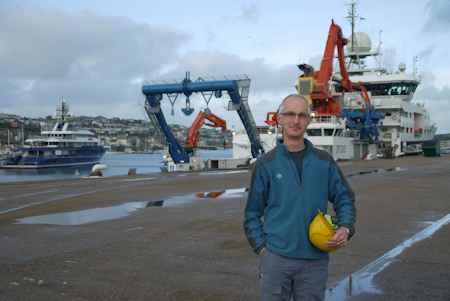
The North West European shelf sea is one of the largest of its kind
Professor Jonathan Sharples, from the University’s School of Environmental Sciences, has set off on a research cruise to the North West Atlantic shelf sea to establish the role of the shelf sea system in carbon and nutrient cycling.
The cruise, aborad the RRS Discovery, is the winter phase of a NERC-funded research project to understand and predict the effects that global warming will have on these seas.
During the cruise of 25 days, Professor Sharples and a team of researchers, will measure the rates at which photosynthetic and consumer plankton incorporate nutrients and carbon into their cells, and study how the combined activity of this biological and chemical system influences the cycling of the major elements in the ocean.
`Shelf seas’ -the seas surrounding continental land masses -have huge socio-economic importance and are the primary regions of human marine resource exploitation, including both renewable and fossil fuel energy sources, recreation, trade and food production. They account for a small proportion of the total ocean area, but have a disproportionately high impact on how the ocean absorbs carbon from the atmosphere.
Professor Sharples said: “The North West European shelf sea is one of the largest of its kind and is therefore likely to play a significant role in marine biogeochemical cycling.
“However, we lack a good understanding of the principal controls on the cycling of carbon and major nutrients which makes it difficult to predict the effects that ongoing and future climate change will have on the cycling of these elements and the carbon removal they support.
The results of each of the seasonal cruises we are undertaking will help to identify aspects of the NW European shelf system which may be sensitive to environmental changes.”
The cruise is the winter phase of a NERC-funded research project which collectively aims to improve understanding of shelf seas in order to accurately predict the effects that climate change will have in this area.
During the month-long cruise, Professor Sharples and a team of researchers, will measure the rates at which photosynthetic and consumer plankton incorporate nutrients and carbon into their cells, and study how the combined activity of this biological and chemical system influences the cycling of the major elements.
Socio-economic importance
`Shelf seas’ – the shallow seas surrounding continental land masses – have huge socio-economic importance and are the primary regions of human marine resource exploitation, including both renewable and fossil fuel energy sources, recreation, trade and food production.
Ocean scientist, Professor Sharples, said: “The North West European shelf sea is one of the largest of its kind and is therefore likely to play a significant role in marine biogeochemical cycling.
“However, we lack a good understanding of the principal controls on the cycling of carbon and major nutrients which makes it difficult to predict the effects that ongoing and future climate change will have on the cycling of these elements and the carbon removal they support.
“The results of each of the seasonal cruises we are undertaking will help to identify aspects of the NW European shelf system which may be susceptible to environmental changes.”
You can find out how the research cruise is progressing at Professor Sharples’ blog.